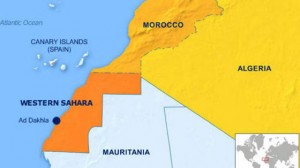World Bulletin
News Desk

Job creation and economic development are crucial to resolving dispute over Western Sahara, two Moroccan researchers say.
Creating jobs for young people, luring foreign investment and providing economic development is key to resolving the longstanding dispute over the Western Sahara region, according to two Moroccan researchers.
“Job creation and the establishment of local administrative systems — along with attracting new investment with a view to developing the region economically — could provide a solution to the ongoing dispute,” Mustafa al-Naimi, a Moroccan researcher in Western Sahara Affairs, told Anadolu Agency.
Al-Naimi noted that there was currently hardly any foreign investment in Western Sahara, as the region remained hostage to a decades-long political dispute between Morocco and the pro-independence Polisario Front.
The best solution to the long-simmering crisis, he said, was to empower the region’s local inhabitants to build administrative systems that would allow them to run their own affairs.
According to al-Naimi, misguided economic development programs — including support for a small local notable class — constituted an obstacle to the region’s economic development.
Regarding the future of Moroccan investment in Western Sahara, he said that Morocco’s autonomy proposals for the region failed to address several outstanding economic problems.
He went on to note that UN Secretary-General Ban Ki-moon might soon propose a new political solution, but was quick to add that this was unlikely to exceed Morocco’s own autonomy proposals.
Al-Naimi also stressed the need to address existing imbalances in the region, noting that the absence of foreign investment in Western Sahara was largely due to the ongoing political dispute.
Rahhal Boperic, head of the Center for Sahara Studies at Rabat’s Mohamed V University, blamed the simmering crisis on the growth of a “non-balanced economy”, which, he explained, was based on local personalities and which failed to benefit other classes in the region.
Speaking to Anadolu Agency, Boperic called for creating new jobs in the region and allowing the private sector to engage effectively in the process.
“It is inconceivable that most companies [in Western Sahara] are based in the city of Laayoune [the largest city in Western Sahara] when they actually operate in Casablanca and other northern cities,” he said.
“Only their commercial records are kept at Laayoune so that they might benefit from tax exemptions,” he added.
“Since the state is undertaking to rebuild the region’s economy and infrastructure, it requires financial investments beyond what is obtained from phosphate mining or the local fishing sector,” Boperic asserted.
In February, Morocco launched a raft of development projects in Western Sahara with a total budget of some $3 billion.
The Western Sahara dispute began in 1975 after Spain relinquished the territory, which eventually led to armed conflict between Morocco and the Polisario Front.
The violence continued until 1991, when a cease-fire agreement was finally signed between the two sides.
The UN is currently sponsoring peace talks between Morocco and the Polisario in hopes of hammering out a final solution to the dispute.
Rabat insists on its right to the territory, although it has proposed wide-ranging autonomy under Moroccan sovereignty. The Polisario, for its part, demands a popular referendum be held to decide the fate of the region.







